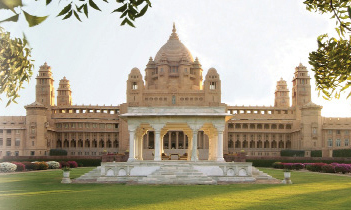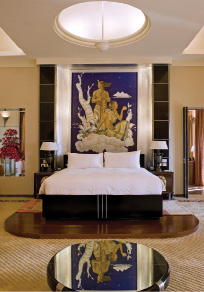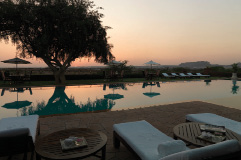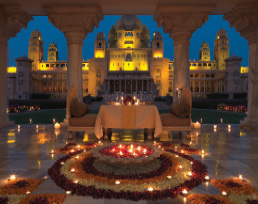- Home
- Media Kit
- Current Issue
- Past Issues
- Ad Specs-Submission
- Ad Print Settings
- Reprints (PDF)
- Photo Specifications (PDF)
- Contact Us

![]()
ONLINE

Editors' Note
Born in January of 1948, Gaj Singh was destined to succeed his father at the age of four. In the years between his birth and his father’s death in 1952, the Rathore State of Marwar-Jodhpur had merged into the Union of India. The young head of the Rathore clan was recognized The Maharaja of Jodhpur by Presidential decree, the 39th of his dynasty. In 1970, after receiving his bachelor’s degree in Philosophy, Politics and Economics (PPE) from Christ Church, Oxford, The Maharaja returned to Jodhpur to assume control of his vast inheritance. The Maharaja Gaj Singh II personally led the reorganization of his affairs and estates, laying the foundations of his future existence through social and political realignments, commercial enterprise, and the creation of charitable foundations and Trusts. The Maharaja’s major thrust has been in tourism. Besides the conversion of his own palaces into hotels, foremost among them the Umaid Bhawan, one of the great palace hotels in the world, and the Mehrangarh Fort into an internationally acclaimed museum, The Maharaja has provided dynamic leadership to the innovative Heritage Hotel movement, the future of tourism in Rajasthan. The Maharaja has also served, until recently, as the Chairman of the Rajasthan Tourism Development Corporation, Government of Rajasthan. The Maharaja is currently on the Governing Council of the Indian National Trust for Art and Cultural Heritage (INTACH) besides being the Convenor of its Rajasthan Chapter. His own forts, Mehrangarh (15th century) in Jodhpur and Ahhichatragarh (12th century) in Nagaur, both managed by the Mehrangarh Museum Trust, are outstanding examples of conservation and restoration work in the country. The Mehrangarh Museum Trust also actively promotes the arts, music, and other cultural traditions of Marwar. Other charitable foundations settled by The Maharaja are involved in the education of girls, the rehabilitation of defense personnel and families, environmental projects and water harvesting in rural areas, the medical care of weaker sections, and the management of ancestral temples. The intervening years have also seen Gaj Singh II serve as India’s High Commissioner to Trinidad and Tobago as well as a term in the Rajya Sabha, the Upper House of Parliament in New Delhi.

Umaid Bhawan Palace
This is the result of two sets of circumstances: one is my legacy and connection to the land and the people. Despite my being away for 14 years of education in England, I was always taught by my mother and my grandmother that I had a responsibility and a role to play in Jodhpur. Also, when I came back, the circumstances and politics had changed. The special privileges that were guaranteed to us in the constitution were taken away by an amendment of the constitution, and we became ordinary citizens. So to get the maximum political gains, the press, the media, the bureaucrats, and the politicians chose to stand against us to show that they were with the poor people. Therefore, they targeted big industry and us.
As a young man coming back with ideas to do things, it was terribly frustrating. The first 10 years went into restructuring, creating companies, trusts, legal battles, and so on. Eventually, the government changed, and the new government was more favorably disposed and offered me a posting as a High Commissioner to Trinidad and the surrounding English speaking islands. So in 1978, I took my family and went to Trinidad. We were there for two years. Before leaving, I signed up with one of the leading hotel companies to operate the Palace Hotel. With professional management, it grew from then on.

Maharani Suite bedroom
It was initiated by a small group of people, and in a Democracy, numbers count; and the way it was packaged, people swallowed it. But we felt let down because two of my Uncles, my maternal Uncle and my Uncle who is married to my Aunt, were both leading a group of Princes that came together at that time to negotiate and to fight this battle, which they did fight quite successfully. We were even ready to open negotiation and step back gracefully as we had done before, when the states were merged. But that was not to be.
Because the Bangladesh war happened, which made Mrs. Gandhi into a hero, she won a thumping two thirds majority in the election that followed in 1972, which gave her the strength to amend the constitution.
No. When we were being targeted nationally and being made out to be unpopular tyrants, locally, the sentiment and the feelings of the people were very positive, and that was reassuring. But it was also frightening because the expectations were very high, including that I should run for Parliament in the election in 1971. But I did not meet the age qualification; you have to be 25 years old. So people approached my grandmother saying that somebody from the family must stand, and if it couldn’t be me, then it must be my mother. Of course, I helped in the process and I saw a little more of the public from close up but I didn’t like what I saw about politics. That’s why I felt it was better to get involved directly with people through institutions, create trusts, foundations, and work with NGOs, and that is what I have been doing.

Outdoor pool
The lack of governance and the chaotic way that our cities are developing. What I see happening to my beautiful, beloved Jodhpur is uncontrolled growth without any thought. Even if there is thought, it’s being implemented the wrong way. Development has to be there so that’s for the better, but the character and heritage of the city are being lost. At the same time, large numbers of people are coming into the city, and the facilities that should be provided due to a larger number of people are not there, so there is unauthorized construction, crowding, dirt, and squalor. It’s easy for someone to come and give them electricity and water, but that creates more problems. So the whole aspect of lack of governance; the bureaucratic and endless delays to get clearances, which breed corruption; and the courts taking forever are all very frustrating.
I was hoping my son would be taking over the tourism and business side of things, so I could concentrate more on the foundations, which is what I enjoy working on – the educational and the rural projects that we have. But my son, my heir, was injured in a polo accident. He’s recovering well and is to be married in November. He is able to walk and to do most things himself. He is going through a difficult phase where he recognizes his limitations and he’s not happy with them, but he’s improving all the time and marriage and children will do him and the family a world of good.

Baradari dining experience
Yes, between the main palace and the fort, and one smaller palace with a lake about 20 minutes away, we can offer a good combination. In fact, we had a wedding recently where they used all three venues for different events.
It has varied. When we began, we counted a total of 42, and this means rooms with bathrooms. Then we took it up to 100 for a period. When the Taj came in five years ago, we decided to upgrade and take it to another level. Earlier, it was the only local hotel so we wanted more capacity. But then we wanted luxury and went for more suites and the room count came down to 65.
Yes. We did spend a lot, but it has been worthwhile, and the projections that the Taj gave us in terms of returns, they have been able to maintain. Of course, there has been a bit of a downturn this year, but we’ve managed to make it up with local events like weddings and conferences.
The Maharani Suite. It’s spectacular with its original art deco styling and furniture. In my youth, my mother used to live there and I lived in the opposite suite, in the Maharaja Suite; both are like apartments with a kitchen, dining rooms, and sitting rooms.
That’s true. I tend to get frustrated at trying to find that level of workmanship today. If anything has to be made or repaired, it is difficult to find workmen to get it done well. But sometimes, just getting what is required to make it a more functional hotel is not easy. And to get it right and match the original work is almost impossible.
That has been my idea for some time. But our present manager took up the initiative and wanted to do it, so I approved it.
No, not so much, because now we have the full team, and when things are used, it is better. People ask me how I feel about sharing my home with other people. In India, we are used to noise and the lack of privacy. What is important is that the place works. If I left it alone, the place wouldn’t work. It would be rather gloomy and dull, with dust sheets all over the place, as it was at one time. So I’ve let it now come alive. The lights are all on and things are happening. In addition, the palace was always built not as a private residence but as an official residence for Maharajas, so it’s meant for entertainment, cultural activities, and hospitality.

Palace’s Rotunda dome
Yes, that is a big problem, especially in a place like Jodhpur, because the professionals getting high salaries don’t like to leave the big cities; you have to induce them.
Education is a top priority with most Indians and this is why Indians are doing so well; the families save up and educate their children. The difference is it is skewed in favor of the male child; the female child doesn’t get the same preferential treatment. So that is why I tried to persuade them to send their girls to school. We have also set up a school in my mother’s name.
Additionally, we have a facility where we are working in the villages with another foreign NGO in health and hygiene, and women’s welfare and educating rural girls. We managed to tie up with another school here that has a hostel, and we have about 80 girls from the villages in that hostel. We’ve had a hard time persuading the families to let the girls come and study, but it has been a very successful program. They are studying right up to class 12, and some even go to college; some of those girls actually have been child brides, so they have to go back and then live with somebody they must have only met when they were young.
We still have a lot of consolidation to be done. Apart from the main Palace Hotel under Taj management, I formed a joint venture with another group. We’re putting up small, natural habitat kind of places and running smaller heritage hotels. I also have big plans for down the hill with the extension of the real estate development that’s going on there and to add a big hospital and a school. We already have a girls’ school, but we need a coed day school, and a professionally managed hospital that also has some training facilities for nurses and medical students.•